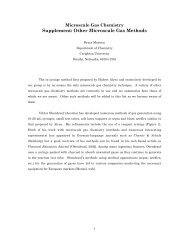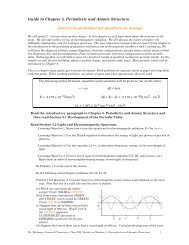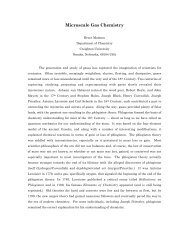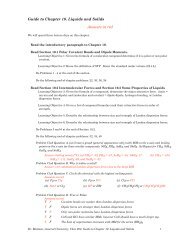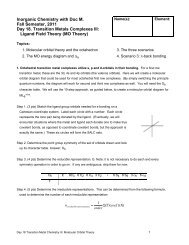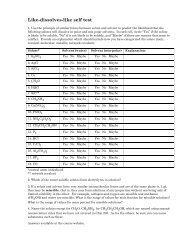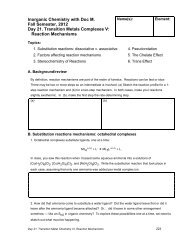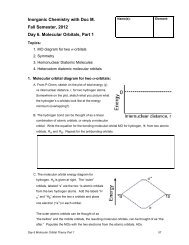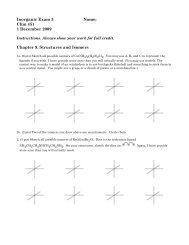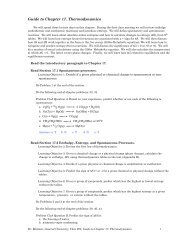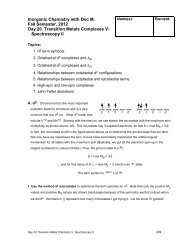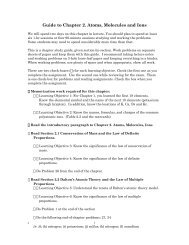Download file. - Mattson - Creighton University
Download file. - Mattson - Creighton University
Download file. - Mattson - Creighton University
Create successful ePaper yourself
Turn your PDF publications into a flip-book with our unique Google optimized e-Paper software.
<strong>Creighton</strong> <strong>University</strong><br />
General Chemistry, Chm 205 Sections A & C<br />
With Dr. Bruce <strong>Mattson</strong><br />
Spring Semester, 2013<br />
Description:<br />
Syllabus & Course Information<br />
course website: http://mattson.creighton.edu/<br />
Chm 205 is a continuation of Chm 203. Concepts and theories covered include<br />
thermodynamics, kinetics, chemical equilibrium, and applications of equilibrium theory to acids<br />
and bases, solubility, oxidation-reduction, coordination chemistry, and nuclear chemistry.<br />
As a student of this course, you should:<br />
• attend class every time<br />
• as a simple courtesy to your fellow students and to me, arrive on time and avoid<br />
leaving during class<br />
• come to class prepared every time<br />
• be attentive participants during lecture (do not sleep, whisper, daydream, or<br />
study other subjects)<br />
• ask questions when something is unclear<br />
• take thorough and complete notes – write down key discussion points and not<br />
just what I’ve written on the board<br />
• record observations from classroom demonstrations<br />
• study chemistry (do homework) daily<br />
• come see me for help with the homework<br />
• behave in a professional manner, as expected of a <strong>Creighton</strong> student<br />
• believe in yourself and your ability<br />
• turn your cell phone off and be fully engaged in the classroom activities<br />
Why should you do these things?<br />
• You will have a better chance of earning a good grade in the course.<br />
• You will be fully engaged in classroom activities, maximizing learning.<br />
• You will have a better chance of making a positive impression on me. Over the<br />
next few semesters, you may think of me for a possible reference (for student<br />
leadership programs, scholarships, pharmacy school application, etc.). You have<br />
an opportunity this semester in lecture and lab to make a favorable impression.
1. Introduction.<br />
This course is designed for students with a good background in chemistry and math.<br />
This syllabus contains course information that will be of use throughout the semester. All of<br />
the course policies are described herein. Please take a few minutes sometime before the<br />
next class meeting to become familiar with its contents. If you have further questions<br />
regarding the course organization and policies, please ask me. Chm 205 is taught in<br />
multiple sections with a different chemistry professor wholly responsible for each section.<br />
Although we may use a similar syllabus, our policies are often different. Only policies<br />
described herein pertain to this class.<br />
Chm 205 is a continuation of Chm 203 and builds on the skills learned in Chm 203. For<br />
this reason, only students who earned a “C” or better in Chm 203 may continue with Chm<br />
205. For most students, Chm 205 consists of topics that contain a significant amount of new<br />
material over the high school treatment of the topic.<br />
Stay on schedule! Catching up is difficult and never as effective as staying on top from<br />
the start. The “A” and “B” students do their homework every day, typically working on<br />
chemistry about two hours for every one hour lecture. Cramming simply does not work in a<br />
science course.<br />
As your chemistry professor, I wish you success in the course. I am here to help you<br />
with your questions, problems or progress in the course.<br />
2. Textbook and Materials.<br />
All of these materials are required for the course:<br />
1. Text: Chemistry, by McMurry and Fay, 6th Edition.<br />
2. Simple scientific calculator<br />
3. Large loose-leaf binder for notes, handouts, homework, etc. If you prefer to use a spiral<br />
notebook, buy two of them – one for note-taking and one for homework problems. Keep<br />
your materials organized! I will ask to see them from time to time.<br />
3. Office, Phone, e-Mail.<br />
My office is Hixson 262; e-Mail: brucemattson@creighton.edu. I check e-mail several times<br />
a day, so that is the best way to contact me.<br />
4. Attendance Policy.<br />
I require attendance. I feel that I have information that will be useful and interesting I know<br />
that attending my lectures will help you on the exams. Attendance points are awarded as<br />
part of your daily folder score. Arrive to class on time, plan to dedicate the time period to<br />
diligent work on chemistry, and do not leave during class. Sometimes it cannot be helped to<br />
arrive late and sometimes it is necessary to get up and leave during class, but try to avoid<br />
doing so. It is inconsiderate to others around you and is disruptive. I reserve the right to<br />
take off 1 or 2 points from your folder score (See Item 8, below) if I feel you are not engaged<br />
in the class work (this includes sleeping, looking at your cell phone, whispering to another<br />
student, working on another class assignment, etc.)<br />
5. Homework and Homework Quizzes.<br />
Almost every day there will be homework problems to do. Working problems is the single<br />
most important way to prepare for tests. Ask questions about these problems when you are<br />
stuck. You should work problems on a daily basis and with a few friends as a "Study<br />
Group." You are only responsible for the sections already covered in lecture (i.e., you never<br />
need to work ahead in terms of the homework quiz.)<br />
Homework will be assessed by homework quizzes given at 8:30 Tuesday mornings. You<br />
can use your homework to answer the quiz. Most homework quizzes are worth 10.0 points
apiece, for a total of 100 points. Missed quizzes cannot be made up. Your lowest quiz<br />
score, including a missed quiz, will be replaced with a score of 10.0 points.<br />
What will be on the “homework quiz”? The quiz will generally ask about homework<br />
problems from lecture material covered on the previous Monday, Wednesday and Friday.<br />
Consult the Chapter Reading Guide that you will receive for each chapter in order to<br />
determine which problems are due throughout the previous week.<br />
6. Office Hours.<br />
Office hours are those hours during which I am in my office (HL-262) and available for<br />
answering questions and discussing and studying chemistry. On my office door, I post a<br />
weekly schedule. I have several office hours daily, Monday – Thursday. Check my door to<br />
see if I am available. When my door is open, you are welcome to come in! If you prefer an<br />
appointment, sign up on my door for a time slot.<br />
7. Course Content.<br />
A day-by-day syllabus (calendar) is included with this information.<br />
8. In-class “folder” activities.<br />
For a portion of each lecture, you will work in small group and usually work together on one<br />
or more chemistry problems. These will be collected and will contribute to your grade.<br />
Folder activities contribute 20 total points to your exam score. *<br />
9. Learning Objectives.<br />
You will be given learning objectives for each chapter.<br />
10. Course website.<br />
This course is supported by a website. The site includes the course syllabus, previous<br />
year's exams, etc. Link to it from http://mattson.creighton.edu/<br />
11. Unit Exams.<br />
Exams usually cover two chapters. Taking the exam at the assigned time is expected. If<br />
you cannot take the exam at the assigned time, you should have a pre-approved excuse<br />
with appropriate paper documentation. Other excuses, regardless of how compelling, are<br />
unexcused. The exams are based on the lecture material, assigned material from the text<br />
and the homework problems. You will ONLY be allowed to use a non-programmable<br />
calculator and pencils on the exams. Calculator slipcovers, cell phones, and backpacks are<br />
not allowed. Each of the exams is worth 100 points: 20 points earned from in-class folder<br />
activities and 80 points for the exam itself. Exams will be returned as soon as possible after<br />
the exam date, usually by the next class meeting. If you are not present when the exams<br />
are returned, you may pick it up during my office hours. Uncollected exams will be<br />
destroyed after one week. Note: There are no retakes or make-up exams.<br />
12. Re-grading policy.<br />
A grade appeal for an exam must be made to me within three school days of the date on<br />
which the exam is returned. I make photocopies of your exams and re-grading is done from<br />
the photocopies.<br />
13. Missed exams.<br />
Avoid missing exams! There are two types of missed exams: excused and unexcused.<br />
* In rare instances, such as a prolonged illness, the homework and folder activities sum to a small total<br />
and may not help your exam grade. If this happens, you may request that I not use your folder/homework<br />
points to determine your overall score. For example, if your homework/folder activities sum to 10 out of<br />
20 (50%) and your exam score was 60 out of 80 points (75%), the homework/folder points do not help<br />
you. If you make such a request, I would simply give you the 75% that you earned on the exam.<br />
Generally, however, homework and folder activities help you.
o Excused exams include documented reasons for being absent, including being out of<br />
town for sports participation, attending an important family function such as a wedding or<br />
a funeral, court appearances, or being ill with a doctor’s excuse. You must provide me<br />
with the documentation (such as a copy of the wedding invitation) in order for it to be<br />
considered an excused absence. Missed exams with excused absences can be madeup<br />
as soon as possible after the actual exam, but not after the exams are returned in<br />
class. Excused absence exams that are not made up before the exams are returned in<br />
class cannot be made up. The first time this happens, the final will be counted double;<br />
after that, the exams will be given a grade of zero.<br />
o Unexcused absences do not have “documentation” and include becoming sick the night<br />
before the exam, accidentally sleeping through the exam, or feeling like you are not<br />
ready for the exam. No more than one unexcused absence is allowed. There are no<br />
make-up exams. Your score for the unexcused absence will be set to equal 10% lower<br />
than the average score of your other three exams or 10% lower than your final exam<br />
grade, whichever is lower. You definitely want to avoid this scenario! Subsequent<br />
unexcused absences will result in grades of zero.<br />
14. Tutorial Help.<br />
Chemistry majors have been hired to serve as tutors. The tutor schedule will be posted at<br />
the course website as soon as it is known. I recommend that you use my office hours as<br />
your first choice, however.<br />
15. Final Exam. The final exam is a comprehensive, multiple-choice exam that covers the entire<br />
semester of Chm 205. The final exam will be given at 3:30 PM on Tuesday, 7 May 2013 in<br />
Rigge 120. As with the other exams, you will be allowed to use a non-programmable<br />
calculator on the final exam. Your percentage score on this exam will be determined by<br />
converting your raw score to its corresponding national percentile and then averaging this<br />
number with 100%. Thus, a score that ranks you at the 60 th national percentile will give you<br />
and 80% for your grade on the final exam.<br />
16. Email Grade Distribution.<br />
You will receive your grades via email to your <strong>Creighton</strong> email account unless you notify me<br />
that you do not wish to receive them. This is a popular feature among most students as it<br />
allows you to check for mistakes that I may have made and to keep informed of your course<br />
status.<br />
17. Grading.<br />
The course is worth 600 points in total. Please note that your grade in this course is wholly<br />
determined by your exam grades. There is no other way to earn points, so be prepared for<br />
each exam by attending class, doing your homework, and making sure you understand all<br />
concepts. Course points are distributed as follows:<br />
Exams 1 – 4: 400 points<br />
Homework quizzes 100 points<br />
Final Exam 100 points<br />
Total 600 points<br />
The grade you will be assigned can be determined as follows: A > 90.00%; B+ > 85.00%; B<br />
> 80.00%; C+ > 75.00%; C > 70.00%; D > 85.00%. Note: These are absolute cut-offs. The<br />
“curve” is never adjusted.<br />
18. Appealing the final grade.<br />
After I have determined your final grade, I do consider cases that are within 0.5% of the next<br />
cut-off (3 points). IF you are that close to the next better grade AND your score on the final
exam is at least as good as the grade you desire, you will get the better grade. NO other<br />
cases will be considered in fairness to the class as a whole. *<br />
19. Cell phones and laptops.<br />
Use of cell phones (calling, texting) during class is not allowed. Cell phones must be left in<br />
backpacks, purse, etc. Laptops can be used for taking notes, but teachers are all aware<br />
that students often abuse their use by checking e-mail, working on other assignments,<br />
playing games or surfing the net during lecture. If I am suspicious of what you are doing, I<br />
will start calling on you by name to answer questions. I will also speak to you about the<br />
matter after class.<br />
20. Dropping the course?<br />
If you have a D or F grade on an exam, you may wonder about dropping the course. The<br />
last day to drop the course with a W is Monday, March 25 th .<br />
21. Academic Dishonesty.<br />
The <strong>University</strong> has an established policy on academic dishonesty. The <strong>University</strong> defines<br />
the term to include “representing the work of others to be one's own (cheating on an exam),<br />
tampering with the experiments of others, defacing or tampering with library or student<br />
materials or facilitating dishonesty on an exam.” The latter point is understood to include<br />
situations where you notice cheating occurring but do not report it immediately. In General<br />
Chemistry, the most blatant forms of academic dishonesty include: (a) copying the work of<br />
others on exams, (b) sharing information with others about exams (both during the exam or<br />
between class periods, (c) using notes when notes are not allowed (in calculator slip covers,<br />
palms of hands, baseball caps, slips of paper tucked away, and so on), (d) making changes<br />
on graded materials that have been returned to you, (e) working together on take-home<br />
exam problems when that is expressly forbidden, (f) cell phone photographing or texting<br />
exam information or answers, and so on.<br />
in:<br />
As a member of the <strong>Creighton</strong> community, promise yourself and <strong>Creighton</strong> to join others<br />
committing ourselves to the pursuit of knowledge throughout our lives and to<br />
developing the skills that we have been given.<br />
acknowledging our obligation to respect all women and men and to use wisely<br />
the resources of the world around us.<br />
solemnly promising to uphold the highest moral and ethical standards and thus to<br />
bring credit to the College by our life and our work.<br />
Any act of academic dishonesty tarnishes and diminishes the worth of each of these<br />
promises. Remember your promises. Keep your promises. Live up to your promises.<br />
Extend these promises into lifelong promises to yourself and others. You will not be<br />
disappointed.<br />
In the event that you are accused of engaging in academic dishonesty, you will receive a<br />
“0” for the homework, exam or quiz score. The incident will be reported in writing in<br />
accordance with the protocol set forth by the College of Arts and Sciences. Details are<br />
available at the CCAS website. Students accused of academic dishonesty have the right to<br />
an appeal.<br />
* Example 1: Suppose you have an average of 79.5 after the five exams (including the final) and your<br />
score on the final was 82%. You will get a B for the final grade. Example 2: Suppose you have an<br />
average of 89.4 after the five exams (including the final) and your score on the final was 89%. You will get<br />
a B for the final grade. Example 3: Suppose you have an average of 69.3 after the five exams (including<br />
the final). You will get a D for the final grade, regardless of what you got on the final.
6<br />
13<br />
Daily Plan - Chm 205 Dr. <strong>Mattson</strong><br />
January, 2013<br />
Sunday Monday Tuesday Wednesday Thursday Friday Saturday<br />
7<br />
14<br />
20 21<br />
Chapter 11<br />
Solutions<br />
27 28<br />
Chapter 12<br />
Kinetics<br />
1<br />
8<br />
15<br />
22<br />
HMQ-1<br />
(8:00 am)<br />
29<br />
HMQ-2<br />
(8:00 am)<br />
2<br />
9<br />
16<br />
Chapter 11<br />
Solutions<br />
23<br />
Chapter 11<br />
Solutions<br />
30<br />
Chapter 12<br />
Kinetics<br />
3<br />
10<br />
4<br />
11<br />
17 18<br />
Chapter 11<br />
Solutions<br />
24 25<br />
Chapter 11<br />
Solutions<br />
31<br />
February, 2013<br />
Sunday Monday Tuesday Wednesday Thursday Friday Saturday<br />
3<br />
10<br />
17<br />
4<br />
Chapter 12<br />
Kinetics<br />
11<br />
Chapter 13<br />
Equilibria<br />
18<br />
Chapter 13<br />
Equilibria<br />
24 25<br />
Chapter 14<br />
Acids &<br />
Bases<br />
5<br />
Exam 1<br />
(7:30 am)<br />
12<br />
HMQ-3<br />
(8:00 am)<br />
19<br />
HMQ-4<br />
(8:00 am)<br />
26<br />
Exam 2<br />
(7:30 am)<br />
6<br />
Chapter 12<br />
Kinetics<br />
13<br />
Chapter 13<br />
Equilibria<br />
20 Chapter<br />
14 Acids &<br />
Bases<br />
27<br />
Chapter 14<br />
Acids &<br />
Bases<br />
7<br />
14<br />
21<br />
28<br />
1<br />
Chapter 12<br />
Kinetics<br />
8<br />
Chapter 13<br />
Equilibria<br />
15<br />
Chapter 13<br />
Equilibria<br />
22<br />
Chapter 14<br />
Acids &<br />
Bases<br />
5<br />
12<br />
19<br />
26<br />
2<br />
9<br />
16<br />
23
March, 2013<br />
Sunday Monday Tuesday Wednesday Thursday Friday Saturday<br />
3<br />
10<br />
Spring<br />
Break<br />
17<br />
Spring<br />
Break<br />
24<br />
4 no class<br />
today<br />
11<br />
Spring<br />
Break<br />
18 Chap 15<br />
Aqueous<br />
Equilibria<br />
25 Chap 15<br />
Aqueous<br />
Equilibria<br />
5<br />
No HMQ<br />
12<br />
Spring<br />
Break<br />
19<br />
HMQ-5<br />
(8:00 am)<br />
26<br />
Exam 3<br />
(7:30 am)<br />
6 Chap 15<br />
Aqueous<br />
Equilibria<br />
13<br />
Spring<br />
Break<br />
20 Chap 15<br />
Aqueous<br />
Equilibria<br />
27 Chap 15<br />
Aqueous<br />
Equilibria<br />
7<br />
14<br />
Spring<br />
Break<br />
21<br />
April/May, 2013<br />
1 Chapter 14<br />
Acids &<br />
Bases<br />
8 Chapter 14<br />
Acids &<br />
Bases<br />
15<br />
Spring<br />
Break<br />
22 Chap 15<br />
Aqueous<br />
Equilibria<br />
28 29<br />
EASTER<br />
BREAK<br />
2<br />
9<br />
Spring<br />
Break<br />
16<br />
Spring<br />
Break<br />
23<br />
Sunday Monday Tuesday Wednesday Thursday Friday Saturday<br />
Mar 31 1 2 3 Chap 16 4 5 Chap 16 6<br />
EASTER HMQ-6 ThermoThermo-<br />
BREAK (8:00 am) dynamicsdynamics<br />
7 8 Chap 16 9 10 Chap 16 11 12 Chap 16 13<br />
Thermo- HMQ-7 ThermoThermodynamics<br />
(8:00 am) dynamicsdynamics<br />
14 15 Ch 17 16 17 Ch 17 18 19 Ch 17 20<br />
Electro- HMQ-8 ElectroElectrochemistry<br />
(8:00 am) chemistrychemistry<br />
21 22 Ch 17 23 24 25 26 27<br />
Electrochemistry<br />
Exam 4<br />
(7:30 am)<br />
Chapter 22<br />
Nuclear<br />
Chapter 22<br />
Nuclear<br />
28 29 30 May 1 May 2 May 3 May 4<br />
Chapter 23<br />
Organic<br />
HMQ-9/10, Chapter 23<br />
20 pts (8:00 Organic<br />
am)<br />
Chapter 23<br />
Organic<br />
May 5 May 6 May 7<br />
Final exam,<br />
3:30 Rigge<br />
120<br />
30



